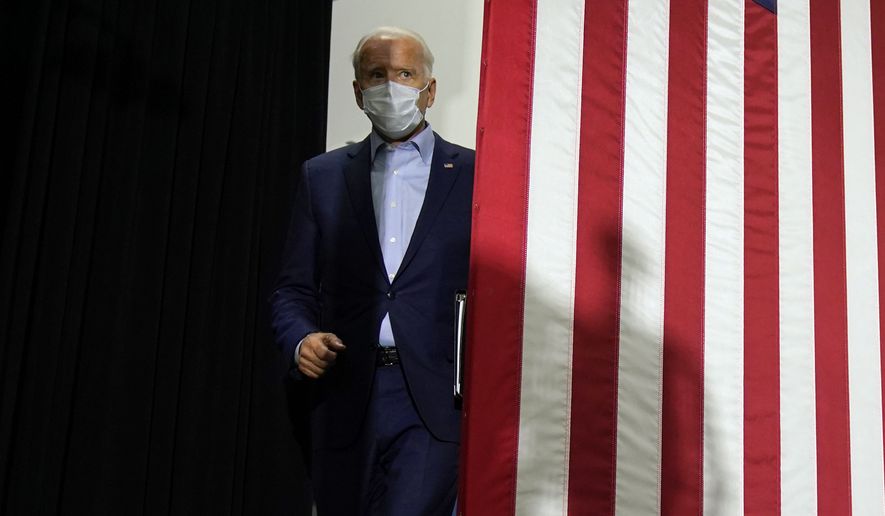LANSING, Mich. — Joseph R. Biden is giving President Trump a run for his money when it comes to being “Mr. Unconventional” in the 2020 presidential race.
The Biden camp is electing to all-but cede the day-to-day spotlight to Mr. Trump — wagering that the Republican’s campaigner-in-chief mode will turn off more voters than it attracts.
“So far, Biden’s following a smart strategy,” said David Yepsen, a former Des Moines Register political reporter who covered presidential contests for decades. “Napoleon reportedly once said that you should ‘never interfere with an enemy in the act of destroying himself.
“Trump is his own worst enemy,” he said.
Not only has Mr. Biden mostly maintained a low profile in Delaware since the coronavirus emerged in the United States, but his camp has also waived off their door-knockers.
“He is the unorthodox candidate in the 2020 election,” said Michigan pollster Ed Sarpolus. “He is not doing what you would normally do as a Democrat.”
And it could backfire. Mr. Sarpolus said Mr. Biden “is going to have to increase his presence” if he hopes to solidify his standing in Michigan before Election Day.
Mr. Biden also is challenging the conventional advertising wisdom of diminishing returns by pouring carloads of money into television ads, which here in Michigan are touting his support for Obamacare as a way to draw a contrast with President Trump on health care.
The issue is getting more attention following Supreme Court Justice Ruth Bader Ginsberg’s death, which comes as the high court prepares to hear the latest Obamacare challenge in November.
When the dust settles from the November election, the Trump campaign is confident that Democrats will regret letting Mr. Biden chuck out the organizing playbook that powered former President Obama’s back-to-back wins.
“They have completely turned their back on the grassroots, the program that helped deliver presidential elections for them and we are going to take advantage of it this year,” said Elliot Echols, the Republican National Committee’s national field director.
Mr. Echols said the “Hidin’ Biden” approach has given Mr. Trump the upper hand. The president’s team returned to the field in July and has been scrambling to register voters, persuade others to give him a look, and rally his already enthusiastic supporters.
“We are the only [presidential] campaign asking voters for their vote in-person at their door,” he said.
That could prove to be the difference between winning and losing in here in Michigan, where Mr. Trump defeated Mrs. Clinton by less than 11,000 voters, and where Mr. Biden is the polling frontrunner.
“A ground game won Trump that state in 2016,” Mr. Echols said. “We do see that in our advantage.”
Mr. Echols said that voters have been cooped up for so long in states with strict lockdowns that they have welcomed the chance to talk to volunteers on their doorsteps.
Down-ticket Democrats, meanwhile, are bucking Mr. Biden’s strategy.
Growing fears about being outflanked on the ground have led some Democrats running in competitive races to rush volunteers back into the field.
Biden campaign manager Jen O’Malley, though, has cast door-knocking as an antiquated way of winning the hearts and minds of voters.
“While you might hear our opponent spend a lot of time talking about the millions of door knocks or attempts that they’re making week to week, those metrics actually don’t have any impact on reaching voters,” Ms. O’Malley told reporters in a recent conference call.
“I know the Republicans want to say, ‘Oh, we have a million door knocks a week.’ Well, that doesn’t really matter,” she said. ” What matters is the conversations you’re having.”
The Biden campaign says it has over 2,500 staff across battlegrounds engaging with voters via phone calls, texting and online messaging, and that it had over 2.5 million conversations with voters in those states in August.
Mr. Trump, meanwhile, has been barnstorming the battlegrounds since the close of the Republican National Convention three weeks ago, traveling to New Hampshire, Pennsylvania, North Carolina, Michigan, Nevada, Arizona, Wisconsin, and Ohio.
He’s scheduled rallies Thursday in Florida, Friday in Virginia, and Saturday in Pennsylvania.
Mr. Biden is less active. He has traveled to Wisconsin, Michigan, Pennsylvania, Florida, and North Carolina since the Democratic National Convention closed out a month ago.
Some have likened Mr. Biden’s approach to former President Ronald Reagan’s re-election bid in 1984 against Walter Mondale when some of the president’s advisors thought a cautious approach was the best way to avoid the sort of senior moment that could undercut his image as a strong leader.
Democrats tried to goad Mr. Reagan to be more active in much the same way Mr. Trump and his allies are trying to egg on Mr. Biden.
Then-Sen. Gary Hart of Colorado charged that Mr. Reagan’s image would fall apart if he operated outside of the “movie facade” campaign rallies staged by the White House.
Craig Shirley, a Reagan biographer, said Mr. Biden’s approach is more like the “Rose Garden” strategy that former President Gerald Ford embraced against Jimmy Carter in the 1976 presidential race.
Mr. Shirley said the big question for Mr. Biden is whether he’s offered voters enough to get behind him.
“You can’t beat something with nothing,” Mr. Shirley said. “The other thing is if you are going to beat something with nothing, you have to do two things: You have to define your opponent and you have to offer policies that the American people agree are going to solve their problems.”
“So Biden better make a damn compelling reason why Trump has failed the last four years and why his policies are better than Trump’s,” he said.
• Seth McLaughlin can be reached at smclaughlin@washingtontimes.com.




Please read our comment policy before commenting.